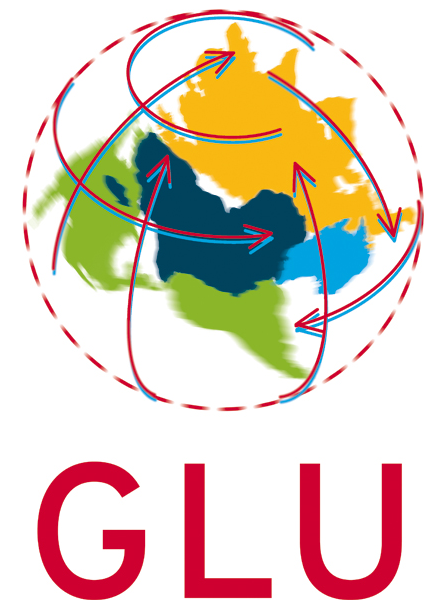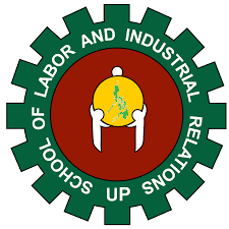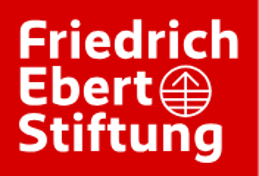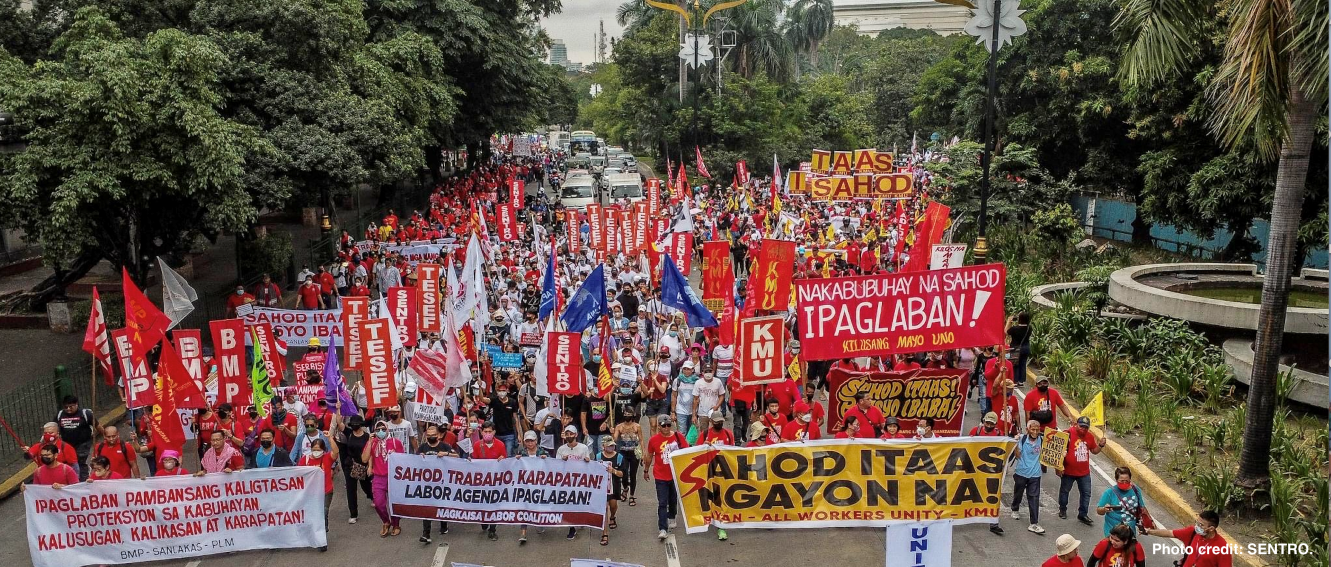
Labour in the Era of Polycrisis: Visions, Strategies and Actions
The 17th Global Labour University International Conference
7-9 December 2026
School of Labor and Industrial Relations
University of the Philippines Diliman
Quezon City, Philippines
Globally and nationally an unprecedented polycrisis threatens to overwhelm societies’ capacities to achieve sustainable and fair solutions. The rapid deterioration of the environment, increasing geopolitical tensions, the rise of popular authoritarianism, a potential global debt crisis, and a shift from corporate globalization towards economic nationalism require responses beyond the usual business of avoiding an immediate crisis by postponing it. Societies need to make fundamental choices.
The 17 th GLU conference in 2026 aims to bring together scholars, labour leaders and activists, policymakers and practitioners from across the world to explore and discuss the potential and possibilities of the labour movement to shape these choices.
Event Facts
Organized by the Global Labour University (GLU) and the University of the Philippines School of Labor and Industrial Relations (UP SOLAIR)
Conference Tracks
After the collapse of the Soviet Union the bipolar cold-war world ended. The capitalist economy became truly global underwritten by the undisputable power of the US. However, optimistic dreams of world peace and strengthened multilateralism didn’t materialize. Instead, countries pursue different strategies to move from unipolar US dominance to a multipolar world. The BRICS is the attempt to create a non-western bloc. The Chinese Belt and Road Initiative builds a China centered trade, finance and transport system. Russia wants to revert its decline through military force. Meanwhile, Europe tries to stop its relative decline by being the world largest trading bloc and a political soft power. The policy space of smaller countries is further eroded with the decline of multilateralism and rules-based arrangements.
As the massive trade deficit and the rising foreign and public debt are reaching unsustainable levels, the US under Trump tries to maintain and strengthen its top position in the global power hierarchy by shifting military costs to allies and to changing the global system of trade and tariffs.
The rearrangement of global forces and power relations is accompanied by increasing nationalism, arms races, and the risks of conflict including war while common global challenges like climate change, migration, health and poverty are neglected. With the re-emerge of the arms race also de-growth ideas need to answer how such policies can avoid higher military vulnerability.
Against this backdrop, this track invites papers that address the following questions:
- How is the global labour movement positioning itself in this changing geopolitical global landscape?
- What are the ideas, strategies and examples that prioritize international collaboration and solidarity over geopolitical confrontation?
The new authoritarian leaders do not come to power through military coups but through the ballot box. Disappointed from liberal democracy many citizens are voting for authoritarian strong men who promise decisive and disruptive measures. The widespread dissatisfaction grows out of frustration about inter alia stagnating or declining real wages, unaffordable housing, rising inequality, high levels of migration, rapid cultural changes, elite arrogance, devaluation of traditional ways of life, and relative loss of status and influence as the position of women, non-white ethnic groups and other minority groups improve.
By blaming minority groups, foreigners or woke-elites for societal problems, authoritarian leaders offer simple answers that mobilize resentment instead of offering real solutions. Their vision of the future often looks like the idealized paste of stable patriarchal world of cultural conformity and traditionalism.
The track invites papers that offer new perspectives and strategies at the international, regional and national level to address the following questions:
- How can labour become instead the voice of the dissatisfied and mobilize for progressive change?
- Are there successful strategies and examples of radical pragmatism that combine improvements of daily life with visionary dreams for sustainable societies of the free and equal?
The global economic system is subject to various crises that have made the international economic system fragile. First, it should be noted that neoliberal globalization, which gained momentum in the 1980s, has not fulfilled expectations of catch-up economic development in most countries of the Global South. Absolute poverty has declined, but in most countries of the Global South, the gap in real per capita income compared with countries in the Global North has widened. Many countries in the Global South have sold off prime assets in their industries and public utilities to foreign direct investors. This has resulted in high profit outflows. In global value chains or value systems, simple tasks are usually taken on, with most of the income going to the leading companies abroad. The trend towards oligopolies and oligopsonies has increased. There is also a tendency to outsource ecological problems from developed countries to the Global South. In many respects, there is an exploitative relationship between less developed and developed countries.
The deregulation of the financial system as part of the neoliberal model has led to dangerously high debt ratios – in terms of foreign debt in countries of the Global South, but in many countries of all country groups also in respect to government and the private sector. Military Keynesianism will have the tendency to increase debt quotas substantially. Overall, the global financial system is unstable, not only because of high debt and overvaluation of stock and real estate markets, but also because crypto currencies are gaining importance as a new financial market segments. In addition, the US dollar is potentially faltering as a stable international reserve currency, and there is a trend towards a multi-currency standard stimulated by geopolitical conflicts.
Track 3 invites papers that draw on a trade union/labour perspective in addressing the following questions:
- How can the globalization model be modified to allow sustainable catching-up of less developed countries in the Global South?
- How can global income distribution including the increasing concentration of rents and power in the hands of multinational companies be modified?
- How can the national and global financial system be made more stable and become an instrument to foster just transition?
The increasing intensity of the climate crisis threatens the life and livelihoods of millions of working people and their families. At the heart of what Adam Tooze called a climate emergency is an outrageous triple inequality: those who have contributed the least to environmental degradation are the most affected by this crisis and have the fewest resources for mitigation and adaptation.
Despite numerous global climate agreements and high-level meetings and commitments the climate goals appear increasingly illusory. Instead of energy transition, we are witnessing an energy expansion—an increase in both fossil fuels and renewables, fueled also by new geopolitical dynamics of national rivalry and increased militarization, which is responsible for 5.5% of global greenhouse gas emissions.
Confronting the climate crisis may require radical thinking beyond the green growth paradigm and other technical solutions that ignore the intensive extractivism involved in producing the infrastructure for renewables.
An economy that cares for people and the planet raises questions whose answers will be different for countries with different levels of development. It requires going beyond the state vs. private debate and developing new visions for inclusive and democratic socio-ecological transformations. Track 4 invites papers that stimulate debate and engage with the following questions:
- What sectors of the economy should grow? And which production should be stopped?
- How can we achieve an environmentally friendly, pro-poor growth economy where the income of those in need can rise while downscaling overconsumption for the sake of consumption?
- What political and macro-economic debates are needed for such changes?
- What transformative visions are emerging from the current resistance to the climate crisis and what is the role of workers and their organizations? How do questions of environmental justice and social justice intertwine in such struggles?
- Are there prospects for the emergence of long-term alliances that can push for these socio-ecological transformations?
Submission of Abstracts
The following are the guidelines for the submission of abstracts:
- Abstracts should be in English.
- Abstracts should have a maximum of 400 words, containing the following elements: introduction, research question(s), methodology, and key findings.
- Abstracts must be submitted via a Google Form on the submission link in this page.
- The author(s) must indicate their preferred conference track.
- The abstract should include the author’s name and institutional affiliation.
- Deadline for abstract submission: 30 January 2026.
Abstracts will be selected based on a double-blind peer-review process. Authors can submit more than one abstract but can present only one paper at the conference.
Guidelines for final papers will be announced later.
Deadlines
- Abstract submission: 30 January 2026
- Communication of acceptance: 31 March 2026
- Full paper submission: 1 October 2026
- Payment of registration fee*: 31 August 2026
*Payment method will be communicated later.
FEES AND EXPENSES
The conference registration fee is US$ 150.00 per participant. The registration fee covers the following: welcome cocktails in the evening of 7 December, light snacks and lunch on 8 and 9 December, and conference materials.
Waiver of the registration fee is possible to a limited number of participants subject to a request with explanation: “I would like to request a waiver of the registration fee because…” The request for waiver should be included in submission of the abstract. The Organizing Committee will assess these requests based on their merit. Participants who will be granted a waiver of the registration fee will be informed accordingly not later than 15 April 2026.
Travel costs must be met from participants’ own resources. The conference organizers will provide a list of hotels within and near the University of the Philippines campus. Participants will arrange for their own accommodation
COMMITTEES AND SECRETARIAT
- Melisa R. Serrano, School of Labor and Industrial Relations, University of the Philippines
- Frank Hoffer, Global Labour University
- Edlira Xhafa, GLU Online Academy
- Hansjörg Herr, Berlin School of Economics and Law
- Friedrich-Ebert-Stiftung (Global and Philippine Office)
- Christine Bischoff, University of the Witwatersrand, South Africa
- Anne Lisa Carstensen, University of Kassel, Germany
- Fabian Georgi, University of Kassel, Germany
- Hugo Dias, Institute of Economics, University of Campinas, Brazil
- Hansjörg Herr, Berlin School of Economics and Law, Germany
- Frank Hoffer, Global Labour University, Germany
- Elaine Hui, Center for Global Workers, Rights, Pennsylvania State University, USA
- Pravin Jha, Centre for Economic Studies and Planning, Jawaharlal Nehru University, India
- Nicolas Pons-Vignon, University of Applied Sciences and Arts of Southern Switzerland
- Francis Ryan, School of Management and Labor Relations, Rutgers University, USA
- Melisa R. Serrano, School of Labor and Industrial Relations, University of the Philippines
- Markus Wissen, Berlin School of Economics and Law, Germany
- Edlira Xhafa, GLU Online Academy, Germany
School of Labor and Industrial Relations, University of the Philippines
- Mary Leian C. Marasigan (Head)
- Vera Eileen V. Pupos
- Brian Anthony Gumiran
FURTHER INFORMATION
Further details are available at the Conference website:
https://global-labour-university.org/events/glu-conference-2026-ph/
(Check back regularly on this webpage for event updates)
For any queries, please contact the Conference Secretariat through:
Mary Leian Marasigan at glu.conference.solair.upd@up.edu.ph.
Conference Venue: UP SOLAIR
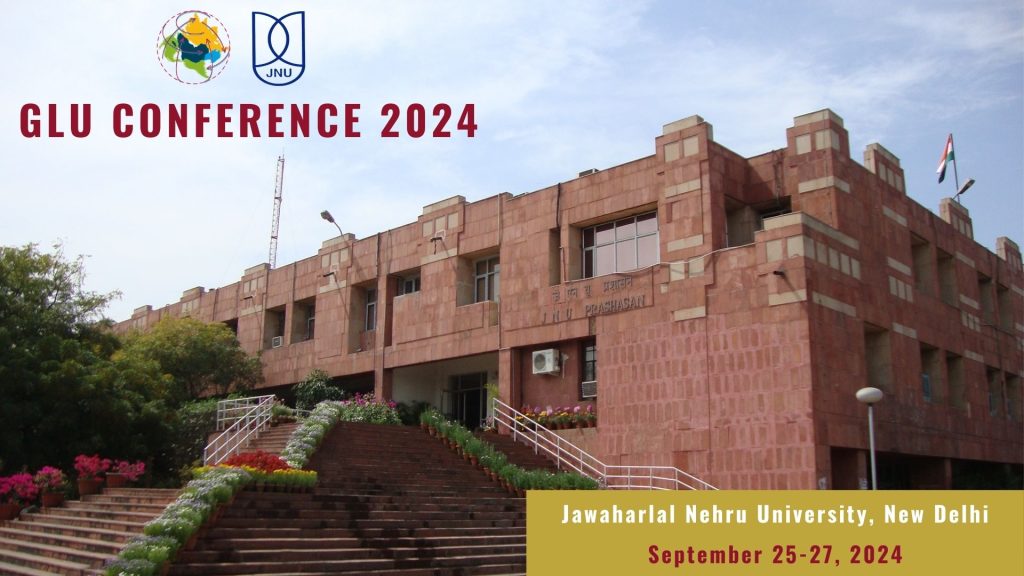
The annual GLU Conference is scheduled for September 25 to 27, 2024, at the Jawaharlal Nehru University (JNU) in New Delhi, India.
This occasion is an opportunity to celebrate the achievements of the GLU network internationally and deepen the discussion on topics central to the network with GLU academics and Alumni, as well as members of national and international trade unions.
As part of the Conference planning, GLU issued a call for papers titled “Globalisation and Transition to an Egalitarian World: Resistance and Alternatives”, and selected proposals that will be presented at the conference.
A major cluster for the conference will focus on platform work and responsible global supply chains, as well as some broader questions related to policy interventions in response to the poly-crises of the current “world disorder. The following thematic clusters will be featured as well: labour regimes and policy, challenges of authoritarianism, global value systems, global care chains, solidarity economy, climate justice, and more.
For more information on the event, stay tuned via our channels, or send a query to jnuglu2024@gmail.com.
You can find the Conference programme, as well as the schedule for parallel sessions below the text.
GLU organizes yearly conferences on topics of common interest in the network. The conferences take place at each GLU campus on a rotating basis and are an opportunity for members of the network to present their research, discuss new ideas and strengthen the network.
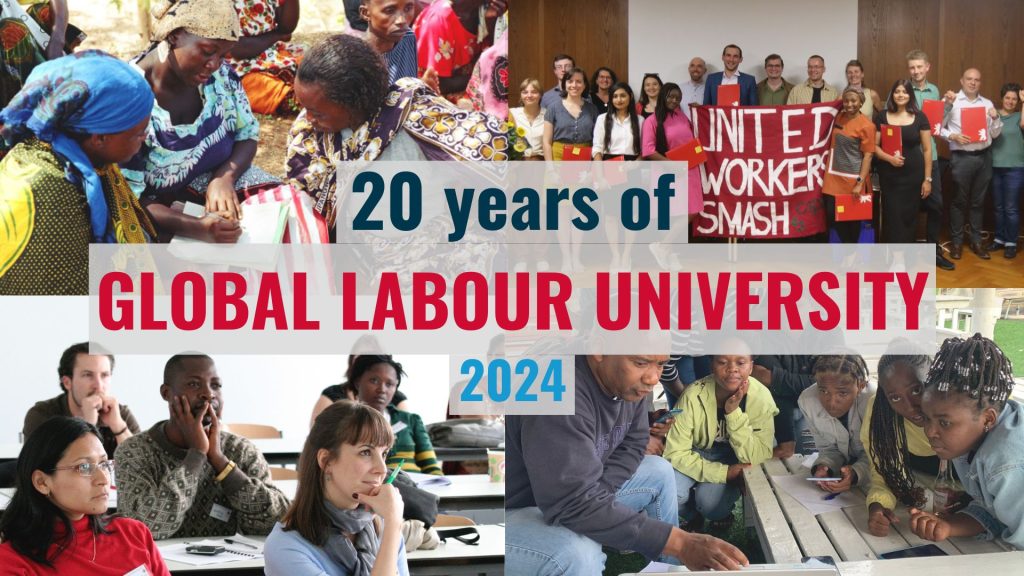
Let us celebrate the grand anniversary toether!
The main event commemorating GLU´s 20th anniversary will be held on April 30th, at Friedrich-Ebert-Stiftung (FES) premises in Berlin.
The celebration will bring together the certified trainers, the current batch students of the GLU-Germany (LPG 20), GLU alumni residing in Germany, professors and representatives of German trade unions, members of the global union federations (GUFs) and other partners and supporters.
Together, we will recount the milestones of the past two decades and offer a glimpse into the future of the network and labour movement at large. The discussion will include many voices from across the international network, revolving around the topics to which the GLU has significantly contributed, especially by reinforcing the voices from the Global South. We will also highlight Alumni networking and the work of Online Academy, as well as honour recently passed Prof. Edward Webster.
Germany is where the GLU started in 2004, and where 20 generations of LPG students have earned their degrees. Over time, the network expanded to other continents and established partnerships with campuses in the US, India, South Africa, and the Phillippines.
Plenary sessions will be live-streamed for those who want to join online.
The programme will run from 9:00 to 21:45 (GMT+2). You can access the full information here.
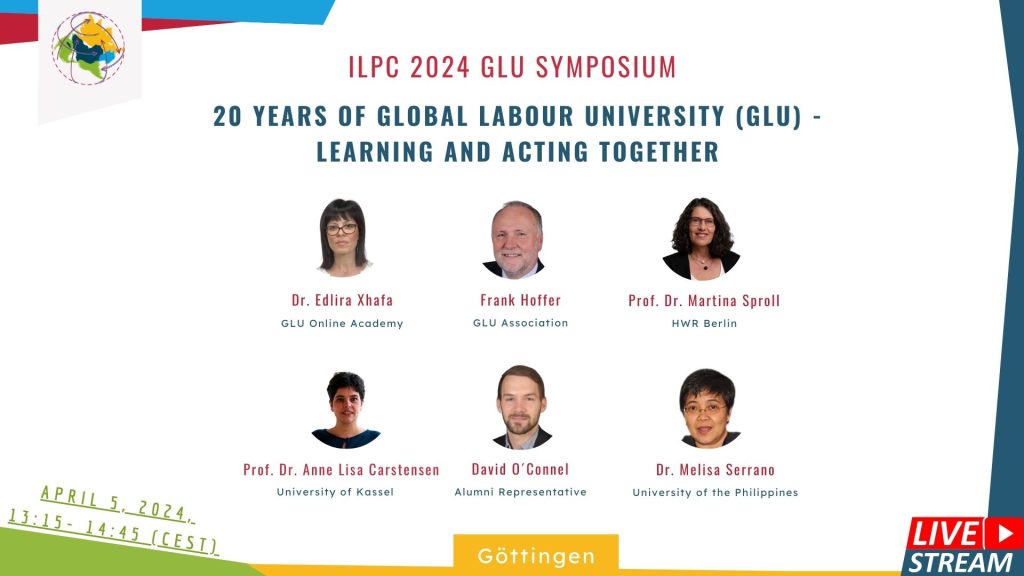
International Labour Process Conference
A special session commemorating 20 years of the Global Labour University will take place at the 42nd International Labour Process Conference, which is happening from 3rd to 5th April 2024, at the University of Göttingen. The event will feature prominent GLU representatives, alumni, and partners from the University of Kassel, HWR Berlin, as well as the University of the Philippines. The GLU session will be held on April 5, from 13:15 to 14:45.
If you would like to join the live stream, you can follow this link.
In addition to the symposia and general conference stream, ILPC 2024 will include five special streams on the topics “Alienation and the Labour Process”, “Housing Workers”, “Labour and Migration”, “Workers’ Transitions throughout the Life Course”, and “Unruly Objects and Interferences”.
Check out the Conference programme here. Note that due to cancellations, there may be minor adjustments to the programme.
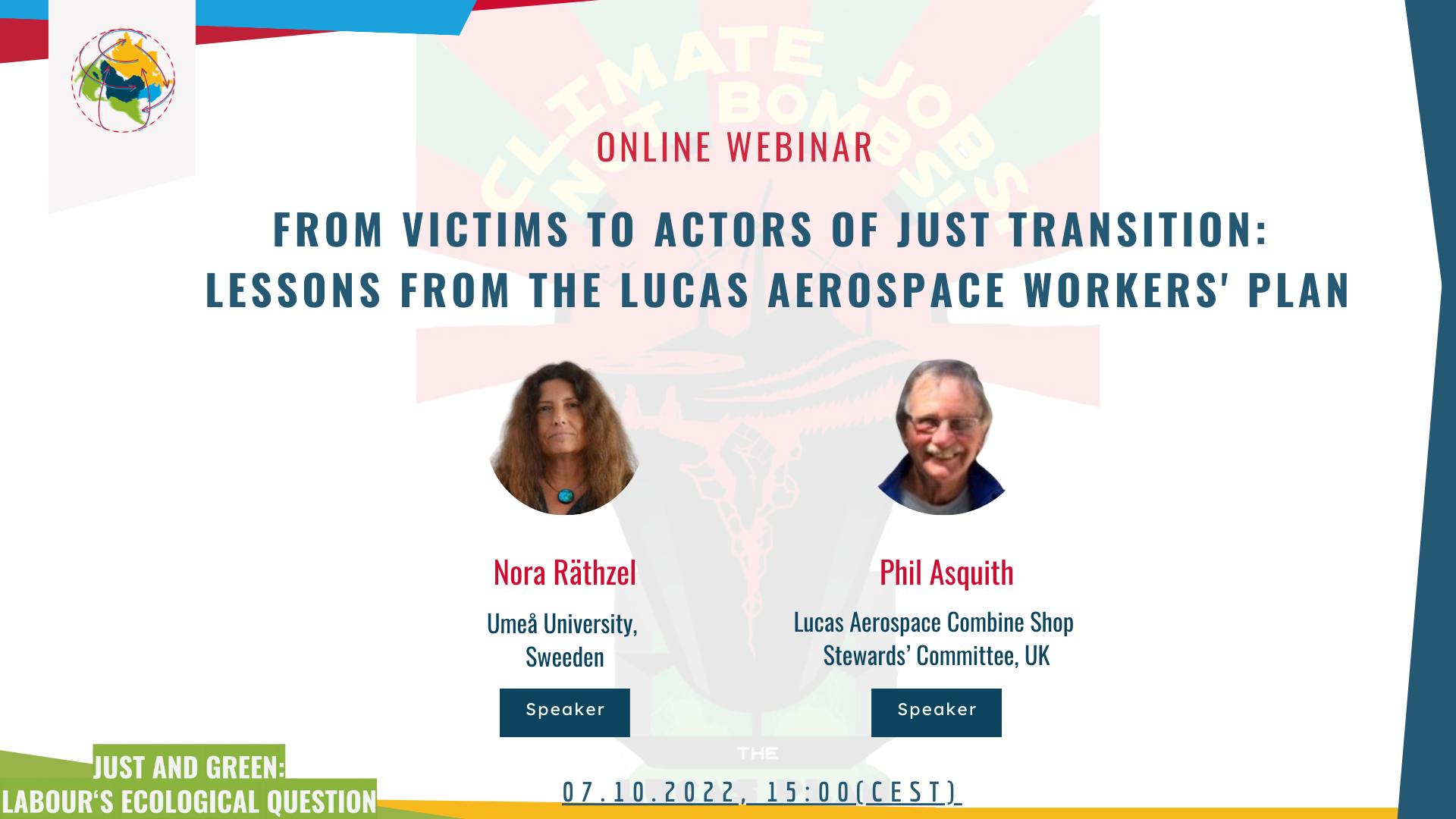
FROM VICTIMS TO ACTORS OF JUST TRANSITION
This free online webinar organised by the GLU Online Academy features Paul Asquith, a trade unionist from the Lucas Plant, and Prof Nora Räthzel.
They discussed this extraordinary project and experiment to transform aerospace production from producing weapons to equipment for health, public transport, and others. The event was organised as a part of the "Just and Green" online course you can take part in for free.
In case you wish to watch the recording of this event, click on the button below.
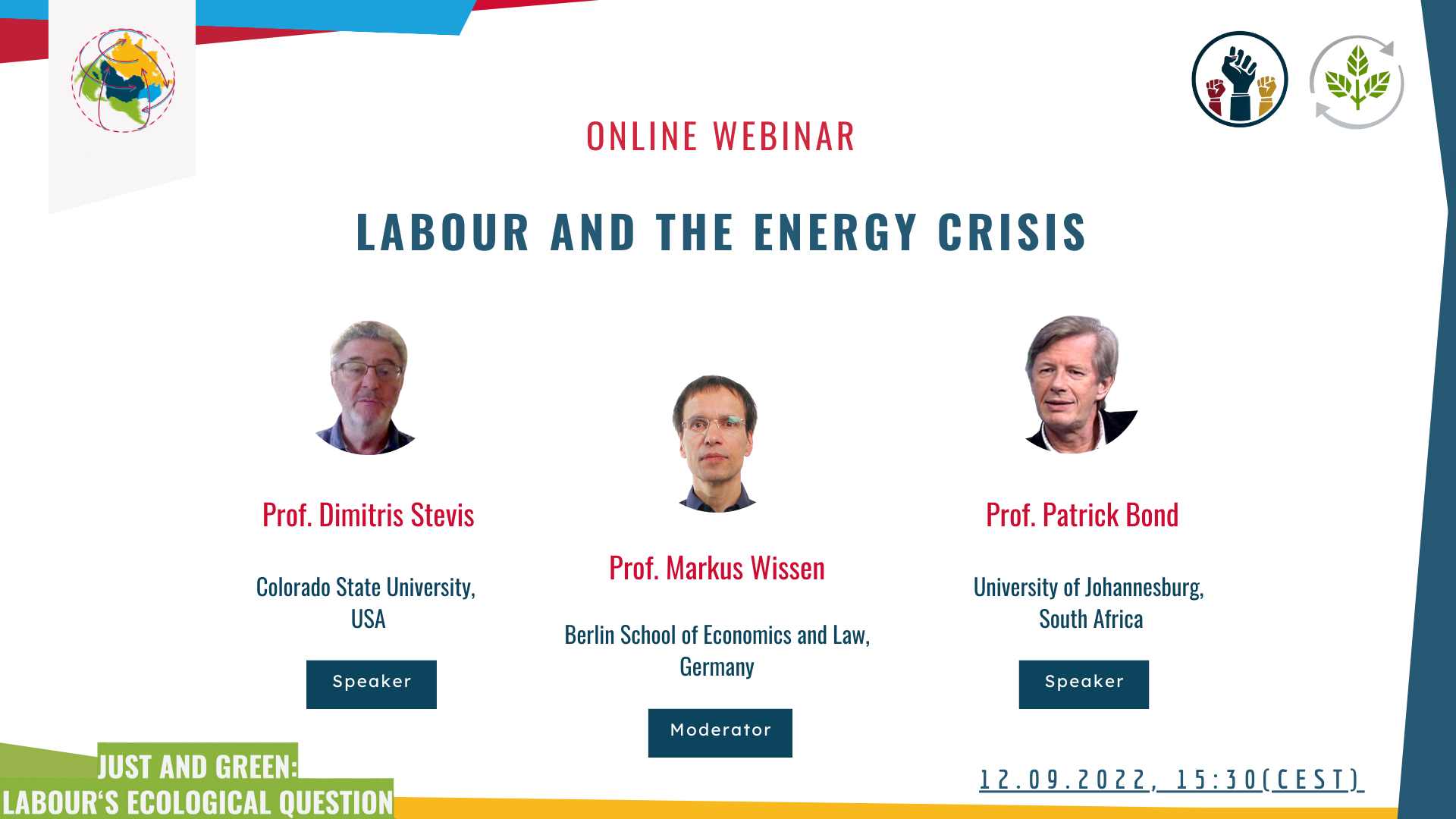
Labour and the Energy Crisis
"Labour and the Energy Crisis", is a free online webinar organised by the Global Labour University.
The event is part of activities surrounding the "Just and Green: Labour´s Ecological Question" course. Check out and enrol in the just and Green Course here.
The speakers featured are Prof. Dimitris Stevis and Prof. Patrick Bond. The session was moderated by Prof. Markus Wissen.
If you missed the event, you can watch the full recording on our YouTube channel by clicking the button below.
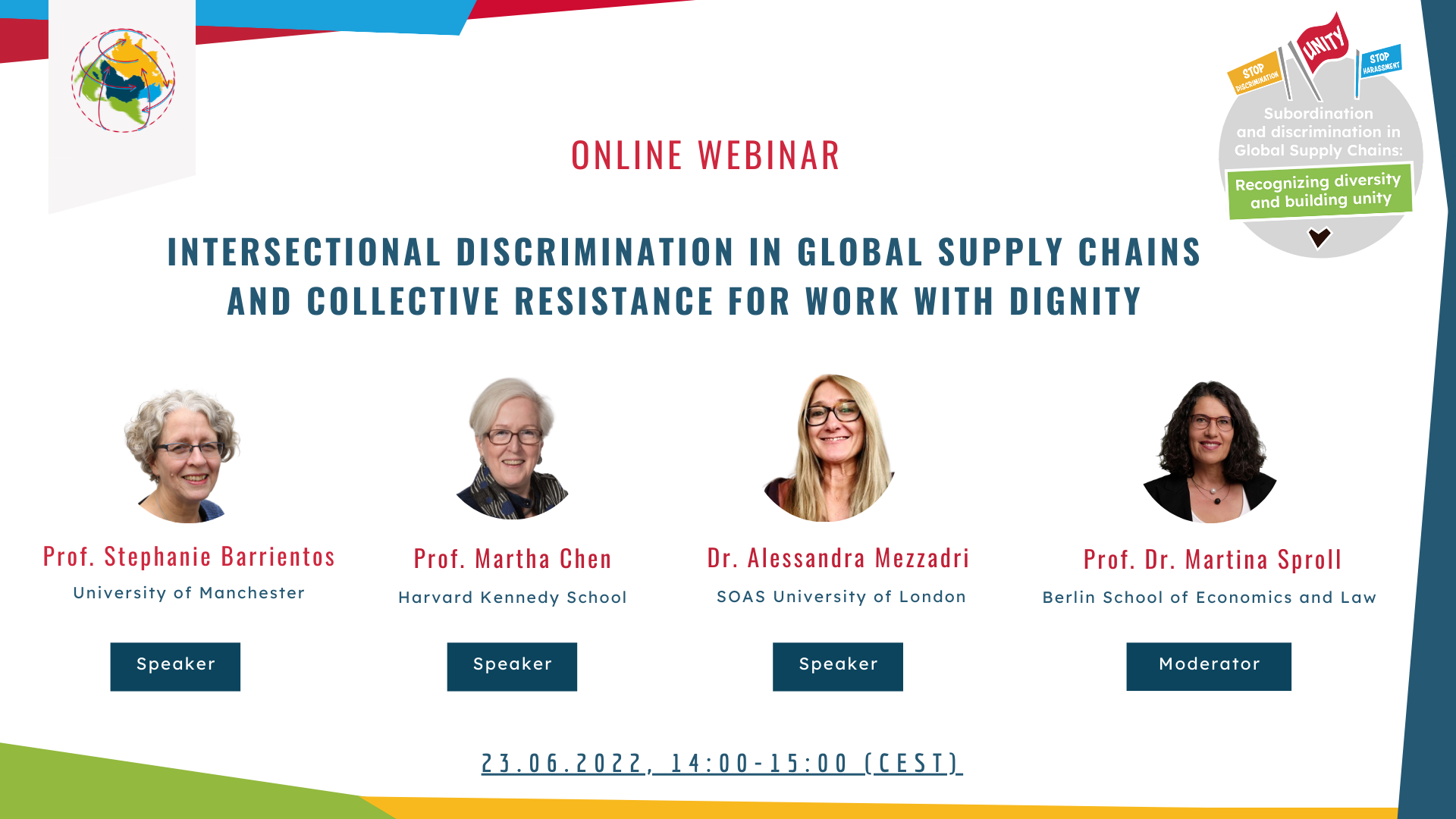
Free Online Webinar
On June 23, 2022, Online Webinar organised by the GLU Online Academy will gather the experts featured in Chapter 2 of the free online course "Subordination and discrimination in GSCs: recognising diversity and building unity".
They will discuss intersectional ways which shape discrimination and subordination of workers in supply chains.
If you are interested in the event, you can visit the Facebook event page or register below.
I GLU CONFERENCE
The effects of globalisation on national economic policies and trade union strategies
The Global Labour University will hold an International Workshop at the Berlin School of Economics, Germany on 5 May 2005. Over 100 people will attend the workshop from all parts of the world. Participants include academics, trade unionists, students and researchers.
Download Info Materials
Download the full conference programme
II GLU CONFERENCE
Global challenges for Labour
The Global Labour University will hold an International Workshop at the University of Kassel, Germany from 5-6 April 2006. Over 100 people will attend the workshop from all parts of the world. Participants include academics, trade unionists, students and researchers.
about the conference
Background:
Unions around the world operate in a complex and rapidly changing environment. In response to the industrial revolution of the 19th century organised labour fought for (labour) legislation and welfare provisions to make the ruthless dynamic of a free market compatible with a democratic and inclusive society. Especially in the industrialised countries, this struggle has been a remarkable success within many nation-states during the second half of the twentieth century. At the beginning of the 21st century, the new wave of globalisation is eroding the regulatory capacity of the nation-state and the capacity of trade unions to defend social achievement at this level. Diminishing labour rights and welfare provisions, informalisation of employment relations and growing inequality in most countries are calling for internationally coordinated responses to global problems.
The conference will discuss two key questions:
- Institutions for global governance – what is needed from a trade union point of view and how to achieve it?
- Employment and wages in a global economy - how to respond to downward pressure?
Event Facts
II GLU CONFERENCE
Download Info Materials
Read more about the conference and call for papers
Download the full conference programme
